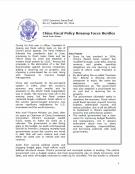
Key Points: Since its last overhaul in 1994, China’s flawed fiscal system has muddled through. Local debt, slowing revenue, and greater spending obligations are now spurring a new round of reform under President Xi Jinping; By eliminating the so-called “business tax,” Beijing is allowing services companies to enjoy the same tax deductions and rebates manufacturers do. The government may also establish a price-based tax on coal and a recurring tax on property; The government ultimately seeks to rebalance the economy. Fiscal reform could boost services, prevent housing bubbles, redistribute income, and reduce pollution. But it will be difficult to implement in China’s segmented economy and authoritarian system; The central government has a clear vision for improving budget flexibility and transparency. Yet it remains ambivalent about how to share revenue, spending responsibilities, and borrowing authority with local governments.
